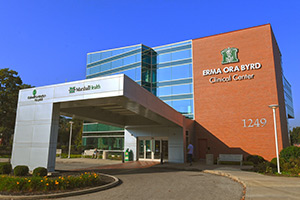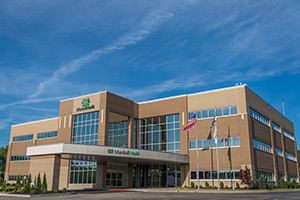Mitral regurgitation (MR) is a common heart valve disorder in which the mitral valve does not close tightly, causing blood to leak backward into the left atrium. To ensure the right amount of blood is flowing throughout the body, the heart compensates by increasing the size of the left ventricle, the main pumping chamber of the heart. As a result, your heart works harder and may raise the risk of irregular heartbeats, stroke and heart failure, which can be deadly.
The good news is that Marshall Health offers advanced treatment options for patients suffering from mitral regurgitation and its effects.
There are two types of mitral regurgitation:
The amount of blood being pushed back into the left atrium determines how severe your mitral regurgitation is. MR severity is typically classified as mild (grade 1+), moderate (grade 2+), moderate-to-severe (grade 3+) or severe (grade 4+).
Signs and symptoms of mitral regurgitation depend on its severity and how quickly the condition develops. MR symptoms may include:
A team of cardiologists will determine the best mitral regurgitation treatment based on your severity of MR and overall health.

A provider-based department of Cabell Huntington Hospital
Erma Ora Byrd Clinical Center
1249 15th Street
Fourth Floor
Huntington, WV 25701
Phone: 304.691.8500

An outpatient department of Cabell Huntington Hospital
Marshall Health - Teays Valley Main Building
300 Corporate Center Drive
2nd Floor
Scott Depot, WV 25560
Phone: 304.733.7865
Call for more information or to schedule an appointment.
Marshall Cardiology
304.691.8500